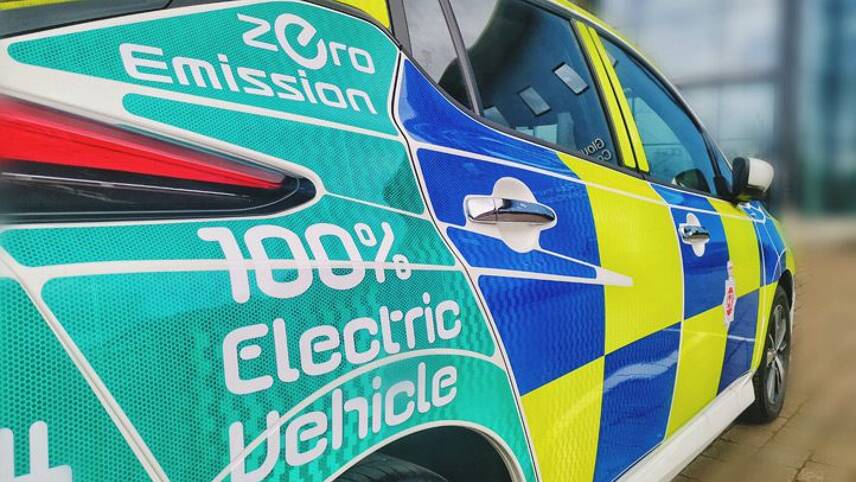Register for free and continue reading
Join our growing army of changemakers and get unlimited access to our premium content

The vehicles are expected to deliver annual savings of almost 190 tonnes of CO2 and will also generate £138
New electric vans and cars provided by Nissan will see 21% of Gloucestershire Constabulary’s entire fleet be EVs, a figure the force claims is higher than any other police force in the UK. The Metropolitan Police has 546 low-carbon vehicles in its fleet – a combination of hybrid, hydrogen fuel cell and fully-electric vehicles – but as it is a considerably largely fleet the percentage is lower.
Gloucestershire’s Police and Crime Commissioner, Martin Surl said: “The purchase of these new vehicles is a huge step forward for the Constabulary to reduce its carbon and pollution, and meets part of my commitment to ‘A Green and Pleasant County’ that was outlined in my Police and Crime Plan. It’s a journey we’ve been on for five years and is part of a long-term commitment by my office to ensure our environment is considered at every opportunity.
“The new fleet will save a considerable amount of Co2 and money, giving Gloucestershire a larger percentage of fully-electric vehicles in its fleet than any other force. I hope the constabulary will be able to build on this great work, and extend its electric fleet to 40% within the next four years.”
The majority of the new EVs will be used by local investigation teams, but none will be used as response vehicles. Gloucestershire Constabulary has confirmed that 11 of the vehicles will be marked up as traditional police cars, but with zero-emission labelling.
The vehicles are expected to deliver annual savings of almost 190 tonnes of CO2 and will also generate £138,000 in savings per year as a result of decreased fuel costs and savings to servicing.
Gloucestershire Constabulary also holds ISO 14001 certification for environmental management systems. It was first certified in 2007 and has recertified four times, most recently in February 2019.
Low-carbon catch
Almost 450 low-carbon vehicles have been purchased by police forces across the UK, according to figures obtained under the Freedom of Information Act in 2019. However, the vehicles, which collectively cost at least £1.5m, are used for non-emergency reasons. Charge times were cited as a common reason that more EVs weren’t used for emergency measures.
Back in 2017, it was revealed that London’s police, fire brigade and ambulance services would struggle to meet earlier deadlines to comply with proposed Ultra Low Emissions Zones (ULEZ), largely due to financial pressures and upfront costs of EVs.
Through a freedom of information (FOI) request on responses to a ULEZ consultation, London Assembly found that the Metropolitan Police will likely have 800 non-compliant vehicles facing daily £12.50 charges by 2020, while London Fire Brigade could be subjected to annual costs of £250,000 due to non-compliance.
Matt Mace


Please login or Register to leave a comment.